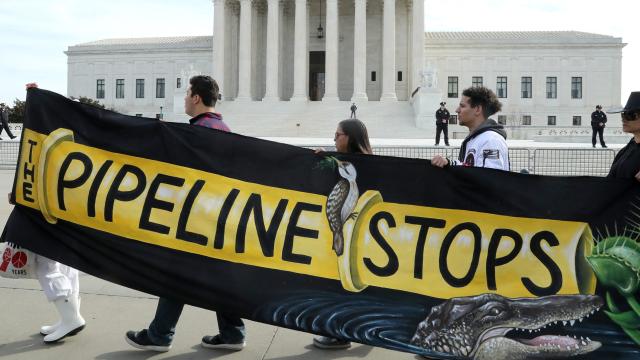After a years-long campaign waged by environmental justice activists, energy giants Duke and Dominion abruptly cancelled their plans to build an $US8 ($11) billion, 966 km fracked gas pipeline on Sunday, citing “ongoing delays and increasing cost uncertainty,” as well as “litigation risk.”
The move, which came just one day before a court order to scrap another major fossil fuel pipeline, is a sign of the importance of grassroots opposition movements and their legal battles. And it’s also a sign that fossil fuels are a bad investment.
In a statement, U.S. Secretary of Energy Dan Brouillette blamed environmentalists for the project’s cancellation. “The well-funded, obstructionist environmental lobby has successfully killed the Atlantic Coast Pipeline,” he said.
This is, of course, absurd. A 2018 report found that fossil fuel representatives spend ten times more on lobbying than environmental advocates. The fact that the cancellation happened is a testament to environmental justice movements’ ability to punch above its weight, drawing strength from people rather than limitless capital. But even more than that, the Trump administration’s statement is absurd because it fails to mention that oil and gas are on the decline.
Despite environmentalists’ relatively small funding pool, the fossil fuel industry appears to see a scientifically sound, but also because they have economics on their side.
[referenced url=”https://gizmodo.com.au/2020/07/judge-shuts-down-dakota-access-pipeline/” thumb=”https://gizmodo.com.au/wp-content/uploads/2020/07/07/c2ttp9mkiaw0la7l3dur-300×169.jpg” title=”Judge Shuts Down Dakota Access Pipeline” excerpt=”In a stunning win for the environmental justice movement, a court just ordered that the Dakota Access Pipeline must be shut down.”]
For years, the oil and gas industry has faced strong headwinds, losing billions of dollars in market value and facing staunch competition from increasingly inexpensive renewable energy. In the wake of the covid-19 pandemic, those headwinds are threatening to blow over the industry altogether. Amid lockdowns, the drop in demand for fossil fuels and subsequent historic low prices have left oil and gas companies in crisis. That’s why we’re seeing them forecast massive dips in value — and planning to build less fossil fuel infrastructure, the Atlantic Coast Pipeline included.
None of this is to say that economic forces are more responsible than advocacy for the pipeline getting pulled. As Dallas Goldtooth, who leads the Keep It in the Ground Campaign of the Indigenous Environmental Network, told Earther, “we would not have gotten these decisions … if it wasn’t for frontline communities mobilizing.”
Rather, it means that in this this economic climate which is so unfriendly to fossil fuels, the fight to stop extracting fossil fuels will become all the more important, because successes could be all the more possible. As the Atlantic Coast Pipeline’s cancellation shows, a slew of lawsuits against companies that are already facing financial woes can be the straw that breaks the camel’s back. Plus, if the process of getting off oil and gas is simply left up to the market, it would have disastrous consequences for workers in the oil and gas industry and for vulnerable communities worldwide. The phase-out must be planned to centre justice, and it won’t be unless environmentalists successfully push governments to do so.
That doesn’t mean the battle will suddenly be easy. Research shows that the fossil fuel industry may be in terminal decline amid the pandemic, but that has not stopped its friends in the government from trying to throw it an economic lifeline while writing off environmental activists’ demands as fringe. And there are still more planned pipelines to fight, with the Keystone XL, Line 3, and Jordan Cove pipelines among them. But the science is clear: it’s absolutely essential to stop producing any more fossil fuel products as soon as possible.
